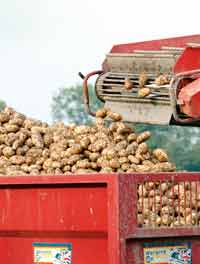Scottish potato crops at risk from Dickeya to be processed in England

Minimising risk of Dickeya solani infections in Scotland is a key policy for the Scottish government. Mike Abram reports on the latest moves
Thirty-one Innovator and Vivaldi potato crops grown from non-Scottish origin seed stocks within Scotland are to be moved and processed south of the border because of the risk from Dickeya solani, Science and Advice for Scottish Agriculture says.
In total 94 non-Scottish origin crops have been grown in the country in 2010 – 46 for seed, the remainder for ware. All have been inspected twice for symptoms of blackleg, including for the more aggressive Dickeya solani species to which the Scottish Government has introduced a zero tolerance policy.
Stem samples were taken from 23 crops, with nine of the crops – all for ware – proving to be infected with the disease, Gerry Saddler, head of diagnostics and analytical services within SASA, says.
Eight of the nine positive findings are in Innovator or Vivaldi varieties, with the ninth case a crop of Challenger.
“We’ve had written assurances from the packer that all Innovator and Vivaldi crops, regardless of whether they carry the infection – 31 crops in total – will be moved as harvested and processed outside of Scotland.”
That will avoid the crops being processed on the farm where they have been grown and minimise any risk of the bacterial disease spreading through contamination of the farm’s equipment, Dr Saddler explains.
The firm involved, Albert Bartlett, will transport the crops ungraded and in bulk, says Gillian Kynoch, the firm’s head of development and innovation. “We are not using boxes to transport the crop to avoid risk. We were concerned that if we used boxes we might not be able to keep adequate control of them. Boxes and equipment used to handle the crop in Scotland will be disinfected thoroughly.”
Potato crops will not be permitted to be grown in the next two seasons on those fields, and the landowners must control ground keepers, Dr Saddler adds. “If in the second year, ground keepers are seen the control measures will be extended.”
Current research suggests Dickeya doesn’t persist in the soil much longer than six months without a host, he says.
The farms where the 31 crops were grown will also be targeted for further inspections as high risk sites next season. Tests have indicated Dickeya solani isn’t present in watercourses around those farms this year, suggesting farms downstream have little risk of spreading infection from using irrigation water, but all will be monitored in future years to ensure this remains so.
Effective hygiene practice will be crucial for growers managing the remaining 17 ware crops and 46 seed crops grown from non-Scottish-origin seed, John Kerr, head of SASA’s Potato Section, says.
Dickeya risk in the majority of the seed crops, however, is thought to be low, with 43 of the crops grown from mini-tubers produced in Northern Ireland.
Less non-Scottish seed
SASA officials expect the number of crops grown in Scotland from non-Scottish origin seed to further reduce next season.
“Growers need to recognise the plant health risks from non-Scottish origin seed potatoes,” Dr Saddler stresses. “We hope we get to the stage where they are not brought into the country.”
Albert Bartlett will not be growing non-Scottish origin seed in the country in future, confirms Ms Kynoch.
“We thought the process of planting once-grown English seed was enough to be safe, and planted it in good faith. It has now be shown that it is not enough, and we can’t take any further risk.”
New varieties are placed within the Scottish seed system for multiplication by the firm, and there is now enough Vivaldi Scottish-origin seed for the firm’s needs, she notes. “But we will have to limit the Innovator business to England until we have enough Scottish-origin seed, which should be in 2011.”
Dickeya solani has never been found on Scottish seed potatoes nor potatoes grown in Scotland from Scottish-origin seed.
The legislative measures introduced in April 2010 were designed to keep the Scottish seed potato industry free from the disease, which is well-established in a number of continental countries, particularly The Netherlands and Belgium.
Scotland’s high health status is a major reason for its thriving export market.
Chip shop risk
One further risk of introducing Dickeya solani into Scotland comes when growers or processors supplying chip shops bring in potatoes in the three or four months early in the year, says Dr Saddler.
“It is an incredibly risky practice. If they use the same grader as they do for their own potatoes, all it takes is for one infected rotting tuber to disintegrate on the grader to potentially infect a large number of tubers that pass over it subsequently.”
The message is not to do it, says Mr Prentice. “Or if you have to, make sure you have separate systems or are taking the right precautions.”
